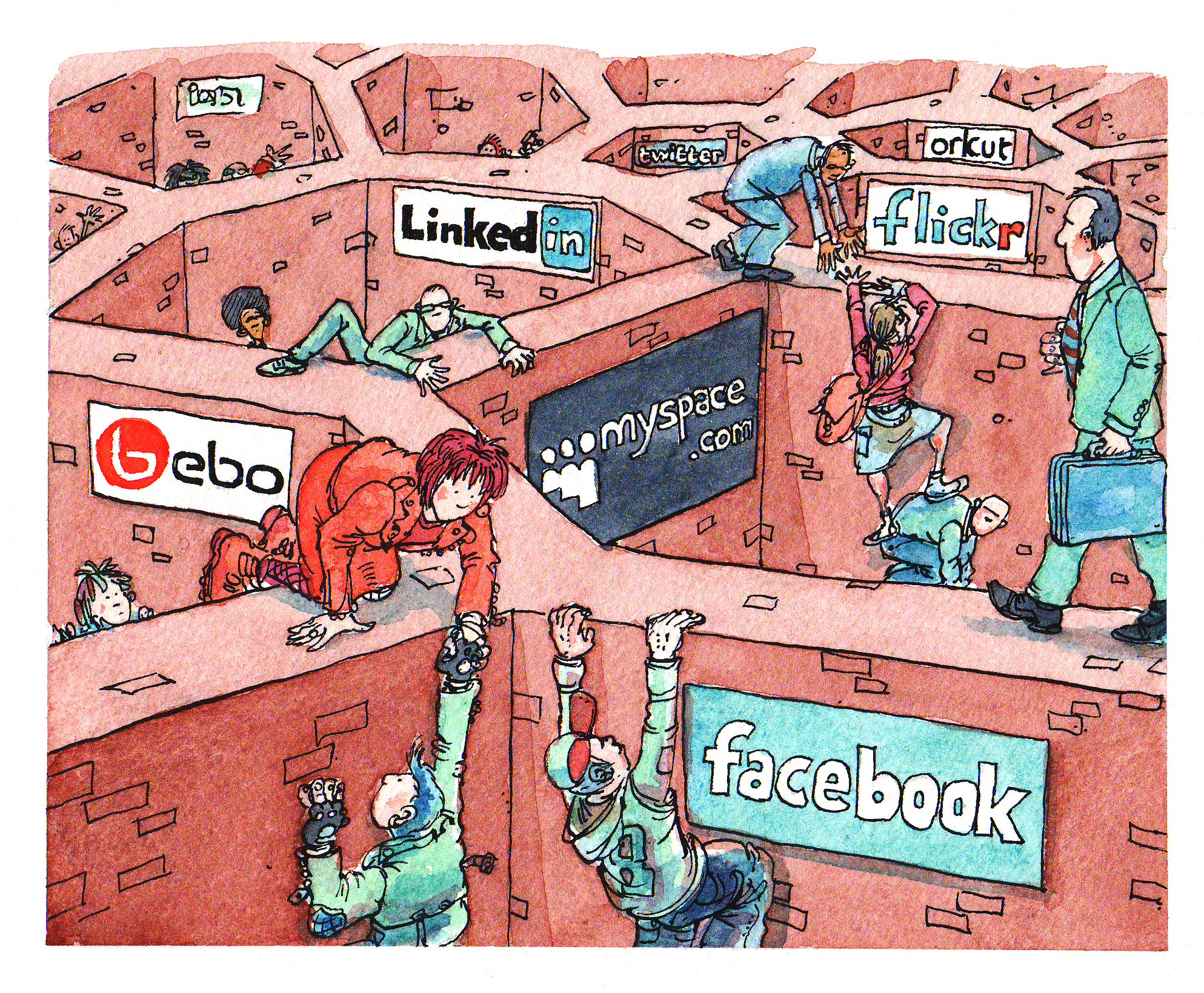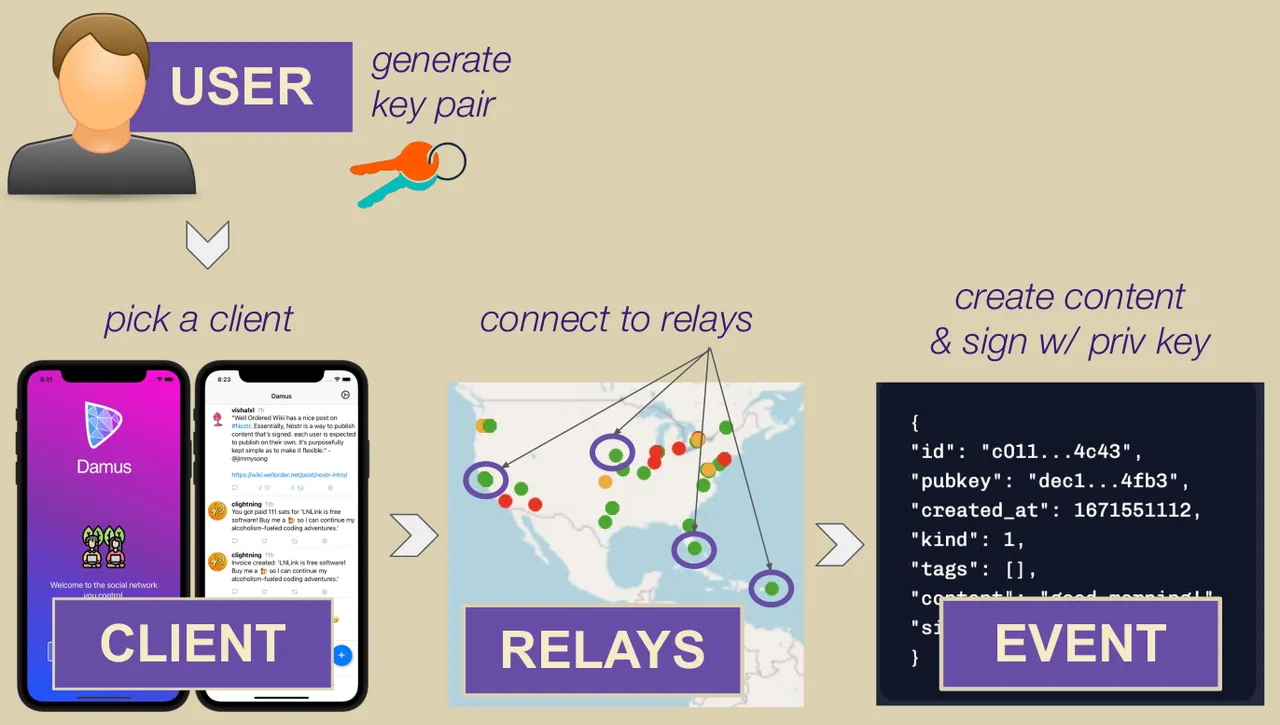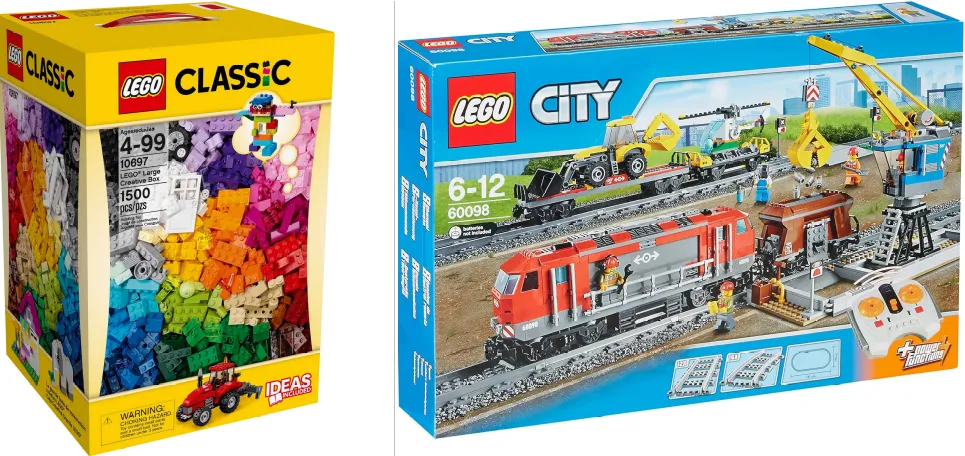
@ Roland
2025-01-21 19:28:49
**Introduction**
The aim of ELI5 (explain me like I'm 5) is to explain difficult things simply. This is urgently needed in our high-tech world, because only by understanding the technologies can we use them properly and develop them further.
 
I'm starting my series with Nostr, a relatively new internet protocol. What the hell is an Internet protocol? In formal terms, it is an international standard that has ensured that the Internet has been working pretty well for over 30 years. It is the language in which computers communicate with each other and which you also use every day, probably without realizing it. http(s) transports your request to a server (e.g. Amazon), and html ensures that a nice page is created on your screen from the data supplied. A mail is sent to the mail server with smtp and retrieved from it with imap, and since everyone uses the standard, this works with every app on every operating system and with every mail provider.
And with an e-mail address like <roland@pareto.space>, you can even move at any time, no matter where. Cool, that's state of the art! But why doesn't this work with chat, for example, is there no protocol? Yes, it's called IRC (Internet Relay Chat → remember the name), but it's hardly ever used. The reasons for this are not technical, but rather apps such as Facebook, Twitter, WhatsApp, Telegram, Instagram, TikTok and others have deliberately created incompatibilities and user dependencies in order to maximize profits.

Since the standard protocol is not used, each app has its own, and we need a handful of apps to exchange information with everyone we know. A mobile phone number is a prerequisite for every account, allowing app manufacturers to track users comprehensively and earn up to USD 30 per account per month by selling the information. The user is no longer the customer, he is the product! Advertising SPAM is the least of the problems with this business model. Servers with millions of user data are a “honey pot”, so they are often hacked and the access data sold. In 2024, the Twitter account of then President Joe Biden was also hacked and no one knew who had written the messages (nor did they before), meaning that the authenticity of the content is not guaranteed with any of these providers. In the same year, the founder of Telegram was taken into custody in France because he refused to build backdoors into his software. Now, to protect “our democracy”, practically anyone can read what information they exchange with whom, e.g. which shampoo certain politicians use.

**Why Nostr?**
And anyone who actually believes they can practice freedom of expression on social media will quickly find themselves in the situation of Donald Trump (who was president at the time), whose Twitter account was shut down in 2021 (cancel culture). The user data, i.e. their profile, contacts, documents, images, videos and audio files - no longer belong to them anyway but are the property of the platform operator; read the terms and conditions. But no, not a good idea, there are hundreds of pages and they are constantly being changed. So everyone uses apps whose technology they don't understand, whose rules they don't know, where they have no rights and which steal the results of their actions. What would the five-year-old say if his older sister offered to “manage” all his toys and then hand them over if he was good? “You must be crazy”, and with that the toddler proves he has more sense than the majority of adults.
**Conclusion: no standards, no data, no rights = no future!**

**How does Nostr work?**
The developers of Nostr realized that the server-client concept had turned into a master-slave concept. The master is synonymous with centralization and becomes the “single point of failure”, which inevitably makes systems dysfunctional. In a distributed peer2peer system, there are no longer any masters but only equal nodes (relays) on which the information is stored. By storing information redundantly on several relays, the system is more resilient in every respect. It is not only nature that has successfully used this principle for millions of years, the Internet was also designed in this way (the ARPAnet was developed by the US military for use in war situations with massive disruptions). All nostr data is stored on relays and the user can choose between public (usually free) and private relays, e.g. for closed groups or for the purpose of data archiving. As documents are stored on several relays, unique document names (URIs = identifiers) are used instead of URLs (locators), making broken links a thing of the past, as are deletions / losses.
 
Each document (called an event) is signed by the owner, making it authentic and tamper-proof and can only be deleted by the creator. A key pair consisting of a private (nsec) and public key (npub) is used for this, as known from mail encryption (PGP). This represents a Nostr identity that can be supplemented with a picture, name, bio and a readable Nostr address (e.g. <roland@pareto.space> ), which is all that is needed to use all the resources of the Nostr ecosystem. And this now consists of over a hundred apps with different focuses, e.g. for personal encrypted messages (DM → OxChat), short messages (Damus, Primal), blog posts (Pareto), meetups (Joinstr), groups (Groups), images (Olas), videos (Amethyst), audio chat (Nostr Nests), audio streams (Tunestr), video streams (Zap.Stream), marketplaces (Shopstr) and much more. Registration is done with a single click (single sign-on) and ALL user data is available to the apps (profile, data, contacts, social graph → followers, bookmarks, comments, etc.), in contrast to the fragmented data silos of the present.
**Summary: one open standard, all data, all rights = great future!**

**Why is Nostr the future of the internet?**
“Don't build your house on someone else's property” also applies to the Internet - for all app developers, artists, journalists and users, because their data is also valuable. Nostr guarantees ownership of the data and overcomes its fragmentation. Neither use nor creative freedom is restricted by excessive license and usage conditions. Passive users become active participants through interaction, co-creators in a sharing economy (**Value4Value**). Open source finally restores trust in software and its providers. Open standards enable developers to cooperate more and develop faster, while guaranteeing freedom of choice for users. Which brings us back to our five-year-old for the last time. Children love Lego more than anything, especially the maxi box “Classic”, because it allows them to live out their imagination to the full in terms of combinations. Adults then give them the far too expensive theme packs, with which you can only build one solution according to the instructions. “What's wrong with my parents, when did they take a wrong turn?” the children rightly ask themselves. But the image can be polished up again if they show their children Nostr, because even five-year-olds understand the advantages.
**The new Internet is decentralized. The new Internet is self-determined. Nostr is the new Internet.**

\
More infos: <https://nostr.net/>\
Quick start: <https://start.njump.me/>
 @ Roland
2025-01-21 19:28:49**Introduction** The aim of ELI5 (explain me like I'm 5) is to explain difficult things simply. This is urgently needed in our high-tech world, because only by understanding the technologies can we use them properly and develop them further.   I'm starting my series with Nostr, a relatively new internet protocol. What the hell is an Internet protocol? In formal terms, it is an international standard that has ensured that the Internet has been working pretty well for over 30 years. It is the language in which computers communicate with each other and which you also use every day, probably without realizing it. http(s) transports your request to a server (e.g. Amazon), and html ensures that a nice page is created on your screen from the data supplied. A mail is sent to the mail server with smtp and retrieved from it with imap, and since everyone uses the standard, this works with every app on every operating system and with every mail provider. And with an e-mail address like <roland@pareto.space>, you can even move at any time, no matter where. Cool, that's state of the art! But why doesn't this work with chat, for example, is there no protocol? Yes, it's called IRC (Internet Relay Chat → remember the name), but it's hardly ever used. The reasons for this are not technical, but rather apps such as Facebook, Twitter, WhatsApp, Telegram, Instagram, TikTok and others have deliberately created incompatibilities and user dependencies in order to maximize profits.  Since the standard protocol is not used, each app has its own, and we need a handful of apps to exchange information with everyone we know. A mobile phone number is a prerequisite for every account, allowing app manufacturers to track users comprehensively and earn up to USD 30 per account per month by selling the information. The user is no longer the customer, he is the product! Advertising SPAM is the least of the problems with this business model. Servers with millions of user data are a “honey pot”, so they are often hacked and the access data sold. In 2024, the Twitter account of then President Joe Biden was also hacked and no one knew who had written the messages (nor did they before), meaning that the authenticity of the content is not guaranteed with any of these providers. In the same year, the founder of Telegram was taken into custody in France because he refused to build backdoors into his software. Now, to protect “our democracy”, practically anyone can read what information they exchange with whom, e.g. which shampoo certain politicians use.  **Why Nostr?** And anyone who actually believes they can practice freedom of expression on social media will quickly find themselves in the situation of Donald Trump (who was president at the time), whose Twitter account was shut down in 2021 (cancel culture). The user data, i.e. their profile, contacts, documents, images, videos and audio files - no longer belong to them anyway but are the property of the platform operator; read the terms and conditions. But no, not a good idea, there are hundreds of pages and they are constantly being changed. So everyone uses apps whose technology they don't understand, whose rules they don't know, where they have no rights and which steal the results of their actions. What would the five-year-old say if his older sister offered to “manage” all his toys and then hand them over if he was good? “You must be crazy”, and with that the toddler proves he has more sense than the majority of adults. **Conclusion: no standards, no data, no rights = no future!**  **How does Nostr work?** The developers of Nostr realized that the server-client concept had turned into a master-slave concept. The master is synonymous with centralization and becomes the “single point of failure”, which inevitably makes systems dysfunctional. In a distributed peer2peer system, there are no longer any masters but only equal nodes (relays) on which the information is stored. By storing information redundantly on several relays, the system is more resilient in every respect. It is not only nature that has successfully used this principle for millions of years, the Internet was also designed in this way (the ARPAnet was developed by the US military for use in war situations with massive disruptions). All nostr data is stored on relays and the user can choose between public (usually free) and private relays, e.g. for closed groups or for the purpose of data archiving. As documents are stored on several relays, unique document names (URIs = identifiers) are used instead of URLs (locators), making broken links a thing of the past, as are deletions / losses.   Each document (called an event) is signed by the owner, making it authentic and tamper-proof and can only be deleted by the creator. A key pair consisting of a private (nsec) and public key (npub) is used for this, as known from mail encryption (PGP). This represents a Nostr identity that can be supplemented with a picture, name, bio and a readable Nostr address (e.g. <roland@pareto.space> ), which is all that is needed to use all the resources of the Nostr ecosystem. And this now consists of over a hundred apps with different focuses, e.g. for personal encrypted messages (DM → OxChat), short messages (Damus, Primal), blog posts (Pareto), meetups (Joinstr), groups (Groups), images (Olas), videos (Amethyst), audio chat (Nostr Nests), audio streams (Tunestr), video streams (Zap.Stream), marketplaces (Shopstr) and much more. Registration is done with a single click (single sign-on) and ALL user data is available to the apps (profile, data, contacts, social graph → followers, bookmarks, comments, etc.), in contrast to the fragmented data silos of the present. **Summary: one open standard, all data, all rights = great future!**  **Why is Nostr the future of the internet?** “Don't build your house on someone else's property” also applies to the Internet - for all app developers, artists, journalists and users, because their data is also valuable. Nostr guarantees ownership of the data and overcomes its fragmentation. Neither use nor creative freedom is restricted by excessive license and usage conditions. Passive users become active participants through interaction, co-creators in a sharing economy (**Value4Value**). Open source finally restores trust in software and its providers. Open standards enable developers to cooperate more and develop faster, while guaranteeing freedom of choice for users. Which brings us back to our five-year-old for the last time. Children love Lego more than anything, especially the maxi box “Classic”, because it allows them to live out their imagination to the full in terms of combinations. Adults then give them the far too expensive theme packs, with which you can only build one solution according to the instructions. “What's wrong with my parents, when did they take a wrong turn?” the children rightly ask themselves. But the image can be polished up again if they show their children Nostr, because even five-year-olds understand the advantages. **The new Internet is decentralized. The new Internet is self-determined. Nostr is the new Internet.**  \ More infos: <https://nostr.net/>\ Quick start: <https://start.njump.me/>
@ Roland
2025-01-21 19:28:49**Introduction** The aim of ELI5 (explain me like I'm 5) is to explain difficult things simply. This is urgently needed in our high-tech world, because only by understanding the technologies can we use them properly and develop them further.   I'm starting my series with Nostr, a relatively new internet protocol. What the hell is an Internet protocol? In formal terms, it is an international standard that has ensured that the Internet has been working pretty well for over 30 years. It is the language in which computers communicate with each other and which you also use every day, probably without realizing it. http(s) transports your request to a server (e.g. Amazon), and html ensures that a nice page is created on your screen from the data supplied. A mail is sent to the mail server with smtp and retrieved from it with imap, and since everyone uses the standard, this works with every app on every operating system and with every mail provider. And with an e-mail address like <roland@pareto.space>, you can even move at any time, no matter where. Cool, that's state of the art! But why doesn't this work with chat, for example, is there no protocol? Yes, it's called IRC (Internet Relay Chat → remember the name), but it's hardly ever used. The reasons for this are not technical, but rather apps such as Facebook, Twitter, WhatsApp, Telegram, Instagram, TikTok and others have deliberately created incompatibilities and user dependencies in order to maximize profits.  Since the standard protocol is not used, each app has its own, and we need a handful of apps to exchange information with everyone we know. A mobile phone number is a prerequisite for every account, allowing app manufacturers to track users comprehensively and earn up to USD 30 per account per month by selling the information. The user is no longer the customer, he is the product! Advertising SPAM is the least of the problems with this business model. Servers with millions of user data are a “honey pot”, so they are often hacked and the access data sold. In 2024, the Twitter account of then President Joe Biden was also hacked and no one knew who had written the messages (nor did they before), meaning that the authenticity of the content is not guaranteed with any of these providers. In the same year, the founder of Telegram was taken into custody in France because he refused to build backdoors into his software. Now, to protect “our democracy”, practically anyone can read what information they exchange with whom, e.g. which shampoo certain politicians use.  **Why Nostr?** And anyone who actually believes they can practice freedom of expression on social media will quickly find themselves in the situation of Donald Trump (who was president at the time), whose Twitter account was shut down in 2021 (cancel culture). The user data, i.e. their profile, contacts, documents, images, videos and audio files - no longer belong to them anyway but are the property of the platform operator; read the terms and conditions. But no, not a good idea, there are hundreds of pages and they are constantly being changed. So everyone uses apps whose technology they don't understand, whose rules they don't know, where they have no rights and which steal the results of their actions. What would the five-year-old say if his older sister offered to “manage” all his toys and then hand them over if he was good? “You must be crazy”, and with that the toddler proves he has more sense than the majority of adults. **Conclusion: no standards, no data, no rights = no future!**  **How does Nostr work?** The developers of Nostr realized that the server-client concept had turned into a master-slave concept. The master is synonymous with centralization and becomes the “single point of failure”, which inevitably makes systems dysfunctional. In a distributed peer2peer system, there are no longer any masters but only equal nodes (relays) on which the information is stored. By storing information redundantly on several relays, the system is more resilient in every respect. It is not only nature that has successfully used this principle for millions of years, the Internet was also designed in this way (the ARPAnet was developed by the US military for use in war situations with massive disruptions). All nostr data is stored on relays and the user can choose between public (usually free) and private relays, e.g. for closed groups or for the purpose of data archiving. As documents are stored on several relays, unique document names (URIs = identifiers) are used instead of URLs (locators), making broken links a thing of the past, as are deletions / losses.   Each document (called an event) is signed by the owner, making it authentic and tamper-proof and can only be deleted by the creator. A key pair consisting of a private (nsec) and public key (npub) is used for this, as known from mail encryption (PGP). This represents a Nostr identity that can be supplemented with a picture, name, bio and a readable Nostr address (e.g. <roland@pareto.space> ), which is all that is needed to use all the resources of the Nostr ecosystem. And this now consists of over a hundred apps with different focuses, e.g. for personal encrypted messages (DM → OxChat), short messages (Damus, Primal), blog posts (Pareto), meetups (Joinstr), groups (Groups), images (Olas), videos (Amethyst), audio chat (Nostr Nests), audio streams (Tunestr), video streams (Zap.Stream), marketplaces (Shopstr) and much more. Registration is done with a single click (single sign-on) and ALL user data is available to the apps (profile, data, contacts, social graph → followers, bookmarks, comments, etc.), in contrast to the fragmented data silos of the present. **Summary: one open standard, all data, all rights = great future!**  **Why is Nostr the future of the internet?** “Don't build your house on someone else's property” also applies to the Internet - for all app developers, artists, journalists and users, because their data is also valuable. Nostr guarantees ownership of the data and overcomes its fragmentation. Neither use nor creative freedom is restricted by excessive license and usage conditions. Passive users become active participants through interaction, co-creators in a sharing economy (**Value4Value**). Open source finally restores trust in software and its providers. Open standards enable developers to cooperate more and develop faster, while guaranteeing freedom of choice for users. Which brings us back to our five-year-old for the last time. Children love Lego more than anything, especially the maxi box “Classic”, because it allows them to live out their imagination to the full in terms of combinations. Adults then give them the far too expensive theme packs, with which you can only build one solution according to the instructions. “What's wrong with my parents, when did they take a wrong turn?” the children rightly ask themselves. But the image can be polished up again if they show their children Nostr, because even five-year-olds understand the advantages. **The new Internet is decentralized. The new Internet is self-determined. Nostr is the new Internet.**  \ More infos: <https://nostr.net/>\ Quick start: <https://start.njump.me/>